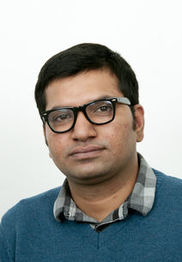
Dr. Razak Khan
Ehemaliger wissenschaftlicher Mitarbeiter
Email:
razak.khan[at]cemis.uni-goettingen.de
Adresse:
Waldweg 26
37073 Göttingen
Deutschland
Werdegang
Dr. Razak Khan ist Research Fellow im ERC Consolidator Grant Projekt „Democratising the Family? Gender Equality, Parental Rights, and Child Welfare in Contemporary Global History“ (DEMFAM) am Fachbereich Geschichte der Freien Universität Berlin. Im Jahr 2014 wurde er an der Berlin Graduate School Muslim Cultures and Societies (BGSMCS) der Freien Universität Berlin promoviert. Anschließend war er Postdoc-Stipendiat am Zentrum für Geschichte der Emotionen am Max-Planck-Institut für Bildungsforschung in Berlin (2014–2015) und am Erlanger Zentrum für Islam und Recht in Europa (EZIRE) an der Friedrich-Alexander-Universität Erlangen-Nürnberg (2019). Er war am Zentrum für Moderne Indische Studien der Universität Göttingen (2015–2024) tätig, wo er sein Habilitationsprojekt „Minor Cosmopolitanism: Islam, Urdu, and Emotional Integration in the Life and Writings of Syed Abid Husain (1896–1978)“ abschließt. Sein erstes Buch, Minority Pasts: Locality, Emotions, and Belonging in Rampur wurde 2022 von Oxford University Press veröffentlicht. Außerdem hat er The Incomparable Festival, Penguin Black Classics, 2021 und Nodes of Translation: Intellektuelle Geschichte zwischen dem modernen Indien und Deutschland, De Gruyter, 2024 herausgegeben.
Derzeit arbeitet er an einem neuen Forschungsprojekt „Unfamiliar: Family, Law, and Democracy in South Asia“. Das Projekt erforscht koloniale Genealogien und postkoloniale Verläufe von Debatten um Minderheiten und Familienrecht in Indien, Pakistan und Bangladesch. Es befasst sich mit den Überschneidungen zwischen Religion, Gender und sexuellen Minderheiten und dem Familienrecht bezüglich Ehe, Adoption und Erbschaft. Zu seinen weiteren Forschungsinteressen gehören die frühe moderne und moderne indische Geschichte, der südasiatische Islam und muslimische Kulturen, öffentliche Urdu-Kulturen, Affekte und Archive, deutsch-indische Verflechtungsgeschichte, Geschichte der Emotionen und Erfahrungen, globale Geistes- und Rechtsgeschichte.
Publikationen
„Muslim Household, Nation and Urdu in Television Dramas in Pakistan“. South Asia 46, 3 (2023): S. 521–538.
„Entanglements in the Colony: Jewish-Muslim Connected Histories in Colonial India“. Modern Asian Studies 56, 6 (2022): S. 1845–1871.
„Place of Knowledge: Education and Urban History in Rampur“. Max Weber Stiftung India Branch Office and GHI London Education and the Urban in India | Working Paper Series 2021/8.
„Introduction: Minor Cosmopolitanisms: Institutions, Intellectuals and Ideas between India and
Germany“. Comparative Studies in South Asia, Africa, and the Middle East 40, 2 (2020): S. 291–294. https://doi.org/10.1215/1089201X-8524215.
„Entanglements of Translation: Psychology, Pedagogy and Youth Reform in German and
Urdu“. Comparative Studies in South Asia, Africa, and the Middle East 40, 2 (2020): S. 295–308. https://doi.org/10.1215/1089201X-8524226.
„Iqbal, German Orientalism and Making of Modern Mysticism“. TRAFO – Blog for Transregional Research Series „40 Years After Orientalism“, Berlin, 03.08.2020. Verfügbar unter https://trafo.hypotheses.org/24680.
„Knowledge in Transit: Global Encounters and Transformation in Magnus Hirschfeld´s Travelogue“. History of Knowledge Blog, 06.11.2019 (aktualisiert 23.08.2024). https://historyofknowledge.hypotheses.org/13116.
„A Festival Extraordinaire: An Indo-Islamic Poem“. Poetry in the Indo-Islamic Millennium Blog, 24.02.2019.
zusammen mit Edgar Cabanas & Jani Marjanen: „Travelers: Transformative Journeys and Emotional Contacts“. In: Gammerl, Benno, Philipp Nielsen & Margit Pernau (Hg.), Encounters with Emotions: Negotiating Cultural Differences since Early Modernity. New York/Oxford: Berghahn Books, 2019, S. 61–84.
„Südasiatische Studierende in Berlin während des Ersten Weltkriegs und der Zwischenkriegszeit“. MIDA Thematische Ressourcen (2019). https://doi.org/10.25360/01–2022–00044.
„Dokumente zu KM Ashraf im Horst-Krüger-Nachlass des Leibniz-Zentrums Moderner Orient, Berlin“. MIDA Thematische Ressourcen (2019). https://doi.org/10.25360/01–2022–00043.
„Entanglements in Colony“. Rezension zu Elite Germans in India von Panikos Panayi. German Historical Institute London Bulletin XL, 2 (November 2018): S. 107–111. https://doi.org/10.15463/rec.1121040329.
„Princely Architectural Cosmopolitanism and Urbanity in Rampur.“ Global Urban History Blog, 05.08.2017. Verfügbar unter https://globalurbanhistory.com/2017/08/03/princely-architectural-cosmopolitanism-and-urbanity-in-rampur/.
„Poetic Sovereignty“. Rezension zu Attendant Lords: Bairam Khan and Abdur Rahim, Courtiers and Poets in Mughal India von T. C. A. Raghavan. Biblio: A Review of Books (Oktober-Dezember 2017).
„Rethinking „National Culture“ of India: An Entangled Indo-German Intellectual History“. TRAFO – Blog for Transregional Research, 16.01.2017 (aktualisiert 08.12.2022). Verfügbar unter https://trafo.hypotheses.org/5729.
„The Social Production of Space and Emotions in South Asia“. Journal of Economic and Social
History of the Orient 58, 5 (2015): S. 611–633.
„Local Pasts: Space, Emotions and Identities in Vernacular Histories of Princely Rampur“. Journal of the Economic and Social History of the Orient 58, 5 (2015): S. 693–731.
„The Case of Falling Walls: Politics of Demolition and Preservation in Rampur“. Economic and
Political Weekly XLIX, 12 (22.03.2014) Web exclusive. Wiederveröffentlicht in EPW 49, 20 (17.05.2014): S. 25–28.
„Recovering Minority Pasts: New Writings on Muslims in South Asia“. Südasien-Chronik – South Asia Chronicle 5 (2015): S. 375–397. https://doi.org/10.18452/17973.
„Rethinking Muslim Politics: The Rampuri Experience“. Economic and Political Weekly 44, 25 (20.06.2009): S. 16–18.
